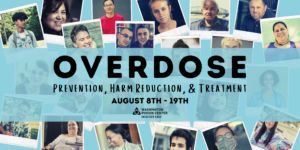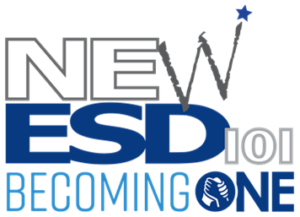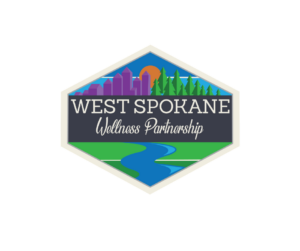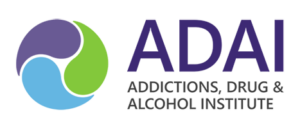
Join the Washington Poison Center as we discuss overdose. Through presentations from our own staff and from external experts, we’ll explore unintentional and intentional factors that can lead to overdose, how to respond to different overdose situations, how to prevent and reduce harm from overdose, and how to access resources and treatment in the state of Washington. Our goal is to open dialogue, de-stigmatize, and ensure everyone is aware of the help available in our communities.
All sessions are free to attend. Sessions will take place on Zoom or on social media. Times listed are all in Pacific Time (PT).
View recordings and materials from the 2021 series here.
MONDAY, AUGUST 8
Responding to an Overdose: Perspectives from Emergency Medical Providers
Watch the recording on Facebook or YouTube
Join the Washington Poison Center and our panel of expert partners as we discuss how emergency medical providers respond to overdose situations.
Panelists
Preventing Overdose: Risks, Relevant Science, and Prevention Opportunities on College Campuses
Watch the recording here
Download the slides here
In this presentation, we will look at the role of classical conditioning (and, therefore, the role of environment) in potential overdose situations, which highlights possible risks associated with spring break, 21st birthday celebrations, and even starting school. Opportunities for prevention and intervention will be discussed.
Speaker: Jason Kilmer, Ph.D
TUESDAY, AUGUST 9
Resources for Teens on Substance Use
View the video clips on YouTube
Teens are faced with ever-changing and unique stressors to cope with. In these video clips, our panel acknowledges these stressors and explores resources that are available for any teen who wants support. It is not our place to judge or stigmatize, but simply to do our best to meet folks where they are. We want people of all ages to feel comfortable and enabled to ask for help.
Panelists:
THURSDAY, AUGUST 11
Medications for Opioid Use Disorder
Watch the recording here
Download the slides here
In this presentation about opioid use disorder (OUD), we aim to share decision making strategies on medication therapy, discuss the pathways for patients and advocates to access care, and dispel common myths surrounding OUD. We hope to engage the audience and leave listeners feeling more prepared and informed on how to help our patients with OUD by utilizing harm-reduction and behavior health interventions in combination with pharmacotherapy.
Speakers: Diep Ngo, PharmD and Alexi Duenas, PharmD
MONDAY, AUGUST 15
Youth Mental Health First Aid
Watch the recording here
Download the slides here
This presentation will cover:
– Awareness of self harm
– Myths and facts related to self harm
– Risk factors and warning signs related to self harm
– Appropriate responses to supporting adolescents who may be struggling with self harm
– General resources
Speakers: Brittany Campbell and Keara Peltram, MPH
Ask Us Anything*
3:00pm – 4:30pm on Twitter
Send questions in advance to mking@wapc.org or ask us on Twitter by tagging @MrYukWA & using the hashtag #AskASPI
Bring your questions about the Washington Poison Center, how we operate, what trends we see, and any others to this “Ask Us Anything” session on Twitter.
*Please note we will not provide treatment advice during this session– call the Poison Helpline (1-800-222-1222) for fast, free, confidential treatment advice 24/7/365.
Speaker: Trent Eason, PharmD, CSPI
TUESDAY, AUGUST 16
Intentional Exposures in Older Adults
Watch the recording here
Download the slides here
Most calls to the Washington Poison Center regarding older adults (ages 60+) are about mistakes with medications. In recent years, however, the poison center has noted increasing calls about intentional exposure reasons, including substance use and self-harm or suspected suicide. Join the Washington Poison Center’s Medical Director and one of the center’s Public Health Educators as they discuss call trends, the unique concerns for older adults with intentional exposures, common substances and their considerations, and harm reduction strategies for providers, older adults, and/or their loved ones.
Speakers: Scott Phillips, MD and Meghan King, MPH
WEDNESDAY, AUGUST 17
Stimulants 101
Watch the recording here
Download the slides here
Join us as we discuss:
– What stimulants are
– Why people use them
– The trends we see in Washington State
– What harm reduction and treatment services look like for stimulants
Speaker: Alison Newman, MPH
An Exploration of Withdrawal
Watch the recording here
Download the slides here
What happens when a drug is stopped? Explore withdrawal syndromes, withdrawal timelines and severity, withdrawal treatment options, and the complex relationship between antidotes and withdrawal.
Speakers: Marlo Murray, PharmD, CSPI & Paul Cole, PharmD, CSPI
THURSDAY, AUGUST 18
Adolescent Self-Poisoning: Discussions with Local Experts
For over two decades, Poison Centers across the United States have tracked substantial increases in cases of adolescent self-poisoning. Although poison centers are experts in supporting the immediate medical needs with these cases, we are not mental health experts and must look to local experts for support. Tune into these videos as we discuss with some of our expert partners (who work with youth in a variety of contexts) the best ways to help reduce and prevent adolescent self-poisoning and support the youth in our lives.
Discussion with Megan Reibel, M.Ed. – watch the video here
School Based Programs Manager, Forefront Suicide Prevention
University of Washington, School of Social Work
Resources:
Discussion with Liz Farmer – watch the video here
Manager of School Based Programs
Valley Cities Behavioral Health
Resources:
Discussion with Stacy Tarango, MD – watch the video here
Spokane Emergency Physicians
Providence Sacred Heart Children’s Hospital
Resources:
FRIDAY, AUGUST 19
Drug Checking 101
Watch the recording here
Download the slides here
Drug checking is an essential harm reduction strategy to prevent overdose. Join us as we discuss what drug checking is, how different types of checking work, how to communicate about drug checking, and what resources are available.
Speaker: Amber Tejada
Meet our Toxicologists
Watch the recording on Facebook or YouTube
Feeling inspired after all you’ve learned during this series? Or, just want to learn more about the people behind our poison center services? Come meet our toxicologists! We’ll sit down with our Medical Director, Associate Medical Director, and one of our call center pharmacists to learn about toxicology, why they pursued a career in this field, and their favorite aspects of their jobs.
Speakers: Scott Phillips, MD, Sasha Kaiser, MD, and Morgan Sturm, PharmD, CSPI
Thank you to our invaluable partners for making this series possible!





